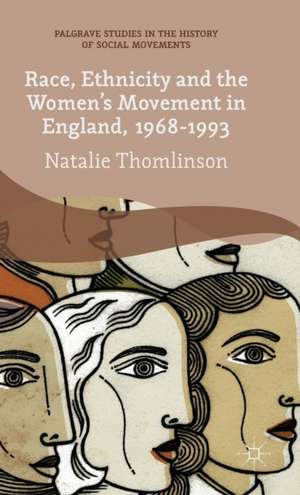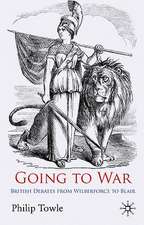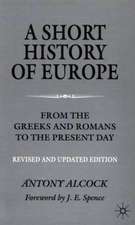Race, Ethnicity and the Women's Movement in England, 1968-1993: Palgrave Studies in the History of Social Movements
Autor Natalie Thomlinsonen Limba Engleză Hardback – 12 ian 2016
| Toate formatele și edițiile | Preț | Express |
|---|---|---|
| Paperback (1) | 451.10 lei 6-8 săpt. | |
| Palgrave Macmillan UK – 27 mar 2018 | 451.10 lei 6-8 săpt. | |
| Hardback (1) | 529.78 lei 6-8 săpt. | |
| Palgrave Macmillan UK – 12 ian 2016 | 529.78 lei 6-8 săpt. |
Din seria Palgrave Studies in the History of Social Movements
- 18%
 Preț: 783.98 lei
Preț: 783.98 lei - 9%
 Preț: 833.83 lei
Preț: 833.83 lei -
 Preț: 425.20 lei
Preț: 425.20 lei -
 Preț: 385.08 lei
Preț: 385.08 lei - 18%
 Preț: 790.28 lei
Preț: 790.28 lei - 15%
 Preț: 583.93 lei
Preț: 583.93 lei - 18%
 Preț: 737.12 lei
Preț: 737.12 lei - 15%
 Preț: 698.30 lei
Preț: 698.30 lei -
 Preț: 414.80 lei
Preț: 414.80 lei -
 Preț: 385.25 lei
Preț: 385.25 lei -
 Preț: 418.45 lei
Preț: 418.45 lei - 15%
 Preț: 590.63 lei
Preț: 590.63 lei - 18%
 Preț: 896.84 lei
Preț: 896.84 lei - 18%
 Preț: 735.38 lei
Preț: 735.38 lei - 18%
 Preț: 782.87 lei
Preț: 782.87 lei -
 Preț: 384.48 lei
Preț: 384.48 lei -
 Preț: 384.09 lei
Preț: 384.09 lei - 18%
 Preț: 953.03 lei
Preț: 953.03 lei - 18%
 Preț: 731.28 lei
Preț: 731.28 lei -
 Preț: 483.70 lei
Preț: 483.70 lei - 18%
 Preț: 786.04 lei
Preț: 786.04 lei -
 Preț: 451.10 lei
Preț: 451.10 lei - 15%
 Preț: 592.12 lei
Preț: 592.12 lei - 15%
 Preț: 580.49 lei
Preț: 580.49 lei - 18%
 Preț: 791.57 lei
Preț: 791.57 lei - 15%
 Preț: 710.42 lei
Preț: 710.42 lei - 18%
 Preț: 736.32 lei
Preț: 736.32 lei -
 Preț: 484.69 lei
Preț: 484.69 lei - 15%
 Preț: 705.34 lei
Preț: 705.34 lei - 18%
 Preț: 729.36 lei
Preț: 729.36 lei -
 Preț: 384.86 lei
Preț: 384.86 lei - 18%
 Preț: 954.77 lei
Preț: 954.77 lei - 15%
 Preț: 712.87 lei
Preț: 712.87 lei -
 Preț: 455.71 lei
Preț: 455.71 lei - 9%
 Preț: 700.32 lei
Preț: 700.32 lei -
 Preț: 391.61 lei
Preț: 391.61 lei
Preț: 529.78 lei
Preț vechi: 623.27 lei
-15% Nou
Puncte Express: 795
Preț estimativ în valută:
101.41€ • 110.19$ • 85.24£
101.41€ • 110.19$ • 85.24£
Carte tipărită la comandă
Livrare economică 21 aprilie-05 mai
Preluare comenzi: 021 569.72.76
Specificații
ISBN-13: 9781137442796
ISBN-10: 1137442794
Pagini: 272
Ilustrații: XIV, 272 p.
Dimensiuni: 140 x 216 x 18 mm
Greutate: 0.48 kg
Ediția:1st ed. 2016
Editura: Palgrave Macmillan UK
Colecția Palgrave Macmillan
Seria Palgrave Studies in the History of Social Movements
Locul publicării:London, United Kingdom
ISBN-10: 1137442794
Pagini: 272
Ilustrații: XIV, 272 p.
Dimensiuni: 140 x 216 x 18 mm
Greutate: 0.48 kg
Ediția:1st ed. 2016
Editura: Palgrave Macmillan UK
Colecția Palgrave Macmillan
Seria Palgrave Studies in the History of Social Movements
Locul publicării:London, United Kingdom
Cuprins
1. The (White) WLM, c.1968–1975
2. Black Women's Activism c. 1970–1990
3. Jewish Feminism in England, c. 1974–1990
4. White Anti-Racist, Anti-Fascist and Anti-Imperialist Feminism, c. 1976–1980
5. Critique and Coalitions: Black and White Feminists Working Together in the 1980s
2. Black Women's Activism c. 1970–1990
3. Jewish Feminism in England, c. 1974–1990
4. White Anti-Racist, Anti-Fascist and Anti-Imperialist Feminism, c. 1976–1980
5. Critique and Coalitions: Black and White Feminists Working Together in the 1980s
Recenzii
“Natalie Thomlinson’s Race, Ethnicity and the Women’s Movement in England, 1968-1993 is a vital addition to this critical historiography. … Thomlinson not only directly contributes to an emergent area of critical research on the history of women’s activism, but also provides a blueprint for considering how this field should be taken forward.” (Kate Mahoney, 20th Century British History, Vol. 30 (4), December, 2019)
Selected by Choice magazine as an "Outstanding Academic Title" for 2016
“This insightful history is a must read for all historians of postwar feminism. ... the author sheds light on a relatively neglected topic in feminist historiography: the various emotional cultures of the women’s movement. Given the general lack of historical scholarship on feminism in the UK, Thomlinson’s narrative of the movement will be foundational for future scholarship. Summing Up: Essential. Upper-division undergraduates and above.” (D. J. Mattingly, Choice, Vol. 54 (3), November, 2016)
Selected by Choice magazine as an "Outstanding Academic Title" for 2016
“This insightful history is a must read for all historians of postwar feminism. ... the author sheds light on a relatively neglected topic in feminist historiography: the various emotional cultures of the women’s movement. Given the general lack of historical scholarship on feminism in the UK, Thomlinson’s narrative of the movement will be foundational for future scholarship. Summing Up: Essential. Upper-division undergraduates and above.” (D. J. Mattingly, Choice, Vol. 54 (3), November, 2016)
Notă biografică
Natalie Thomlinson is Lecturer in History at the University of Wolverhampton, UK.
Textul de pe ultima copertă
This book is the first archive-based account of the charged debates around race in the women's movement in England during the 'second wave' period. Examining both the white and the Black women's movement through a source base that includes original oral histories and extensive research using feminist periodicals, this book seeks to unpack the historical roots of long-running tensions between Black and white feminists. It gives a broad overview of the activism that both Black and white women were involved in, and examines the Black feminist critique of white feminists as racist, how white feminists reacted to this critique, and asks why the women's movement was so unable to engage with the concerns of Black women. Through doing so, the book speaks to many present day concerns within the women's movement about the politics of race, and indeed the place of identity politics within the left more broadly.











